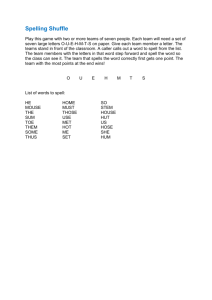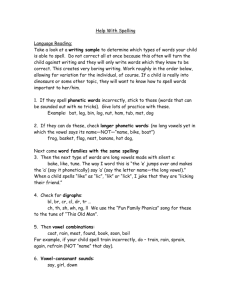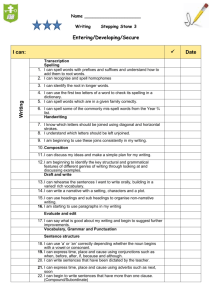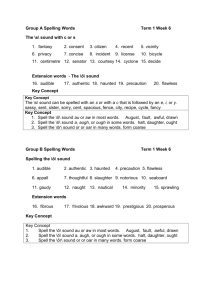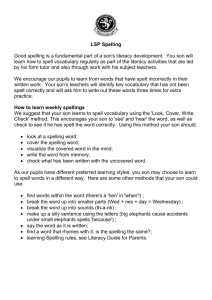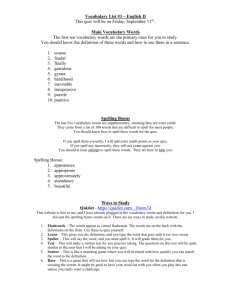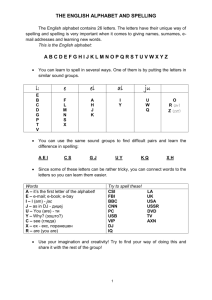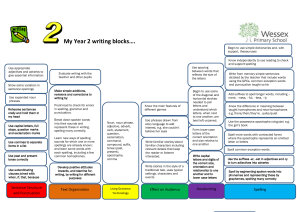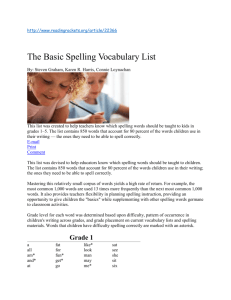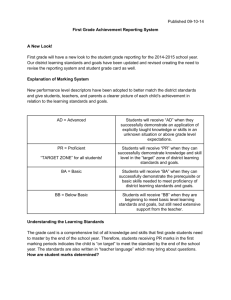Spelling toolkit for words ending in vowels other than e
advertisement
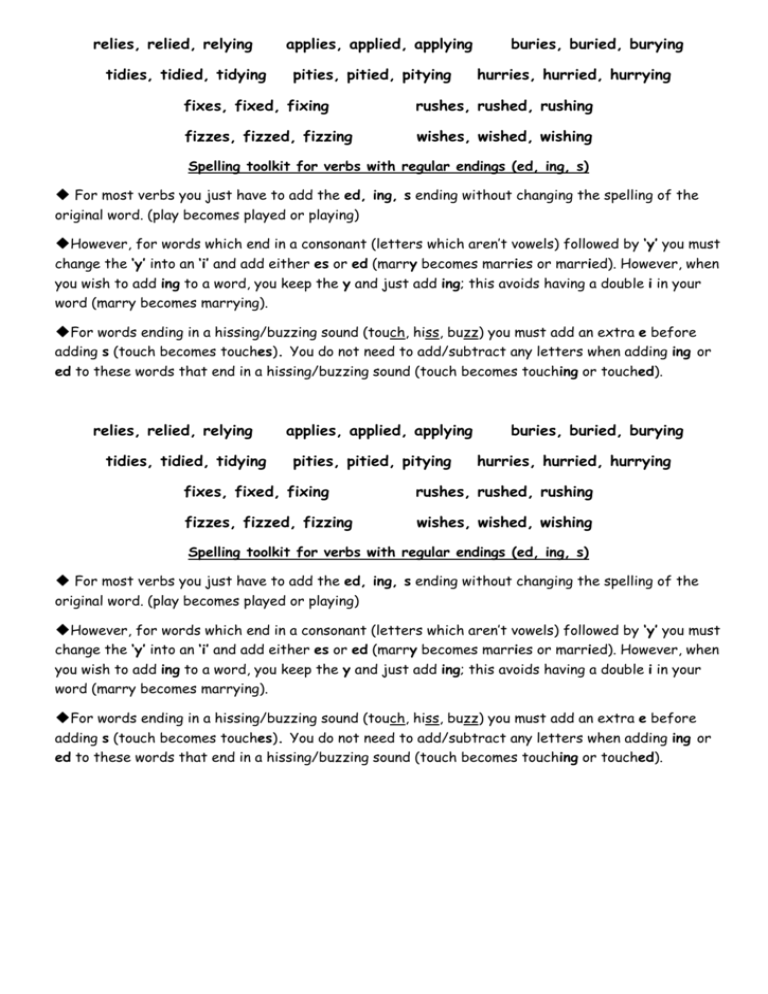
relies, relied, relying tidies, tidied, tidying applies, applied, applying pities, pitied, pitying buries, buried, burying hurries, hurried, hurrying fixes, fixed, fixing rushes, rushed, rushing fizzes, fizzed, fizzing wishes, wished, wishing Spelling toolkit for verbs with regular endings (ed, ing, s) ◆ For most verbs you just have to add the ed, ing, s ending without changing the spelling of the original word. (play becomes played or playing) ◆However, for words which end in a consonant (letters which aren’t vowels) followed by ‘y’ you must change the ‘y’ into an ‘i’ and add either es or ed (marry becomes marries or married). However, when you wish to add ing to a word, you keep the y and just add ing; this avoids having a double i in your word (marry becomes marrying). ◆For words ending in a hissing/buzzing sound (touch, hiss, buzz) you must add an extra e before adding s (touch becomes touches). You do not need to add/subtract any letters when adding ing or ed to these words that end in a hissing/buzzing sound (touch becomes touching or touched). relies, relied, relying tidies, tidied, tidying applies, applied, applying pities, pitied, pitying buries, buried, burying hurries, hurried, hurrying fixes, fixed, fixing rushes, rushed, rushing fizzes, fizzed, fizzing wishes, wished, wishing Spelling toolkit for verbs with regular endings (ed, ing, s) ◆ For most verbs you just have to add the ed, ing, s ending without changing the spelling of the original word. (play becomes played or playing) ◆However, for words which end in a consonant (letters which aren’t vowels) followed by ‘y’ you must change the ‘y’ into an ‘i’ and add either es or ed (marry becomes marries or married). However, when you wish to add ing to a word, you keep the y and just add ing; this avoids having a double i in your word (marry becomes marrying). ◆For words ending in a hissing/buzzing sound (touch, hiss, buzz) you must add an extra e before adding s (touch becomes touches). You do not need to add/subtract any letters when adding ing or ed to these words that end in a hissing/buzzing sound (touch becomes touching or touched). anacondas corgis haikus patios siestas yoyos areas cuckoos igloos pianos skis Zulus Spelling toolkit for words ending in vowels other than e ◆ Nouns ending in o usually become plural (more than one) by adding s to the end, however there are some words that do not follow this pattern. ◆ Most of these words have come from other languages, so they may not follow the same rules as other words in the English language. anacondas corgis haikus patios siestas yoyos areas cuckoos igloos pianos skis Zulus Spelling toolkit for words ending in vowels other than e ◆ Nouns ending in o usually become plural (more than one) by adding s to the end, however there are some words that do not follow this pattern. ◆ Most of these words have come from other languages, so they may not follow the same rules as other words in the English language. anacondas corgis haikus patios siestas yoyos areas cuckoos igloos pianos skis Zulus Spelling toolkit for words ending in vowels other than e ◆ Nouns ending in o usually become plural (more than one) by adding s to the end, however there are some words that do not follow this pattern. ◆ Most of these words have come from other languages, so they may not follow the same rules as other words in the English language. bicycle binoculars aeroplane aerodynamic supernatural superpower supernova microscope microphone transport transplant transaction Spelling toolkit for words which have the same prefix ◆ The prefix, such as ‘aero’ or ‘trans’, appears at the beginning of lots of words in the English language, however its spelling does not change. ◆ If you can already spell the prefix, then you should have a shorter word left to spell with the remaining letters. For example, if you know how to spell the prefix ‘micro’, and you wish to spell ‘microphone’ then all you need to spell is the word ‘phone’. bicycle binoculars aeroplane aerodynamic supernatural superpower supernova microscope microphone transport transplant transaction Spelling toolkit for words which have the same prefix ◆ The prefix, such as ‘aero’ or ‘trans’, appears at the beginning of lots of words in the English language, however its spelling does not change. ◆ If you can already spell the prefix, then you should have a shorter word left to spell with the remaining letters. For example, if you know how to spell the prefix ‘micro’, and you wish to spell ‘microphone’ then all you need to spell is the word ‘phone’. bicycle binoculars aeroplane aerodynamic supernatural superpower supernova microscope microphone transport transplant transaction Spelling toolkit for words which have the same prefix ◆ The prefix, such as ‘aero’ or ‘trans’, appears at the beginning of lots of words in the English language, however its spelling does not change. ◆ If you can already spell the prefix, then you should have a shorter word left to spell with the remaining letters. For example, if you know how to spell the prefix ‘micro’, and you wish to spell ‘microphone’ then all you need to spell is the word ‘phone’.
